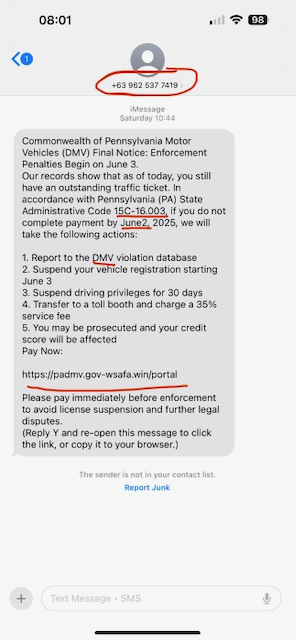- Person Name: Scott Davis
HARRISBURG, PA — The Cybersecurity Association of Pennsylvania is warning residents about a dangerous phishing scam targeting Pennsylvanians via text message. The fraudulent message claims to be a final notice from the “Commonwealth of Pennsylvania Motor Vehicles (DMV),” threatening penalties for an alleged unpaid traffic ticket. However, the details of the message reveal it to be a scam designed to steal personal and financial information.

The text message, which appears to originate from the international phone number +63 962 537 7419 (a Philippines-based number), urges recipients to pay immediately via a suspicious link: https://padmv.gov-wsafa.win/portal. This domain is not affiliated with any official government agency and uses a “.win” extension, rather than the legitimate “.pa.gov” or “.gov” domain used by real government sites.
The message references a statute — “15c-16.003” — which does not exist in Pennsylvania’s administrative code, further confirming its fraudulent nature. It also uses improper formatting, such as “June2, 2025” without appropriate spacing, and inaccurately refers to the state agency as the “DMV.” In Pennsylvania, the Department of Motor Vehicles is known as PennDOT (Pennsylvania Department of Transportation), and does not issue traffic violation notifications or collect payments through unsolicited text messages.
The message claims that failure to comply will result in severe penalties, including suspension of vehicle registration, loss of driving privileges, prosecution, and even damage to the recipient’s credit score — all tactics designed to instill fear and coerce payment.
“This scam is a textbook example of SMiShing — phishing via SMS,” said a spokesperson from the Cybersecurity Association of Pennsylvania. “It combines urgency, fear, and official-sounding language to deceive people into clicking fraudulent links and submitting personal information. PennDOT does not communicate or request payments this way.”
If you receive a similar message, do not click the link or respond. Instead, report the message as junk or phishing directly from your device. If you have already clicked the link or submitted payment, contact your financial institution immediately, file a report with your local law enforcement agency, and notify the Pennsylvania Office of Attorney General.
Residents are encouraged to stay vigilant and remember: government agencies will never request payment or personal information via unsolicited text messages. Always verify the source before responding to any digital communication involving sensitive data.
For more information and ongoing scam alerts, visit the Cybersecurity Association of Pennsylvania online.

Scott Davis
"You can't protect what you don't know"
